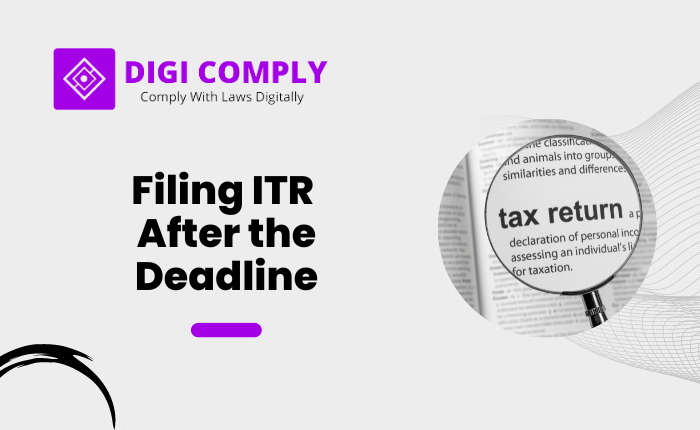In the world of taxes, it’s crucial for taxpayers to know the consequences of missing the Income Tax Return (ITR) filing deadline. The Income Tax Act, of 1961, has a section called 234F that enforces penalties on those who don’t submit their ITR on time. This article aims to inform taxpayers about these penalties, the important deadlines, and the impact of filing late. It urges taxpayers to act quickly and fulfill their tax duties to avoid unnecessary financial burdens.
Section 234F: Penalties for Non-compliance:
At the core of ensuring timely ITR filing, Section 234F of the esteemed Income Tax Act, 1961, assumes a pivotal role by fashioning penalty provisions to induce compliance among taxpayers. For those whose total income surpasses the threshold of Rs. 5 lakh for the fiscal year 2022-2023, a substantial penalty of Rs. 5,000 awaits them should they fall short of meeting the prescribed deadline. Conversely, for individuals with an income up to Rs. 5 lakh, the penalty is mitigated to a comparatively lesser amount of Rs. 1,000. It is incumbent upon taxpayers to comprehend that these penalties stand independent of any other sanctions that may be levied for underreporting income or providing misleading information to the tax authorities.
Critical Deadlines:
The timing of filing Income Tax Returns (ITRs) holds immense importance, with the deadline for the fiscal year 2022-2023 unequivocally set on July 31, 2023. Taxpayers who accidentally miss this deadline still have a chance to rectify the situation by filing their ITRs until December 31, 2023. However, it is crucial to be aware that late filings during this grace period will incur penalties. Therefore, conscientious taxpayers must adhere diligently to the prescribed deadlines to avoid undesirable financial repercussions.
Penalties Beyond December 31, 2023:
The idiom “procrastination is the thief of time” resonates profoundly when contemplating ITR filing. Assessees who choose to neglect their tax obligations even after December 31, 2023, shall face an intensified penalty, a punitive charge amounting to Rs. 10,000. This elevated level of penalty accentuates the urgency of taking swift action and fulfilling one’s tax responsibilities within the demarcated timeframe. As time wears on, the severity of the penalties escalates, reinforcing the imperative of timely compliance.
Interest on Unpaid Tax Amount:
The specter of penalties is not the sole financial consequence that looms over tardy taxpayers. In addition to the penalties, they may also be liable to pay interest on any unpaid tax amount, compounding their financial woes. As it stands, the prevailing interest rate stands at a formidable 1% per month or part of a month, serving as a persistent reminder of the perils of delaying ITR filing. The accumulation of interest on the outstanding tax may inflict a profound financial strain, underscoring the need for prompt adherence to tax obligations.
Reducing Penalties: The Path Ahead:
A proactive and judicious approach is paramount to minimize penalties and interest charges stemming from late ITR filing. For taxpayers who find themselves remiss in meeting the July 31, 2023 deadline, prudent counsel suggests that they expedite the process by submitting their ITRs at the earliest opportunity, even before December 31, 2023. Swift action offers the dual benefit of mitigating financial burdens and fortifying against superfluous liabilities.
Importance of Compliance:
Beyond the confines of penalties and interest charges, the timely submission of ITR reflects a profound sense of responsible citizenship and unwavering adherence to the tax laws of the nation. It assumes the role of a societal contract, engendering a symbiotic relationship between the taxpayers and the government. By punctually filing their ITRs, individuals play an instrumental role in nation-building, enabling the government to efficaciously allocate resources and execute development initiatives with precision.
Conclusion:
In the realm of civic duty and legal obligation, filing your income tax return (ITR) on time is a sacred principle. It is mandated by Section 234F of the Income Tax Act, 1961, and serves as a powerful deterrent against non-compliance, emphasizing the crucial importance of adhering to this requirement. As taxpayers navigate the financial landscape, they must prioritize timely compliance, avoid procrastination, and take responsibility seriously. By doing so, they can avoid unnecessary financial burdens and contribute to the progress and prosperity of the nation.
If You have any queries then connect with us at support@legalsuvidha.com or info@digicomply.in & contact us & stay updated with our latest blogs & articles





